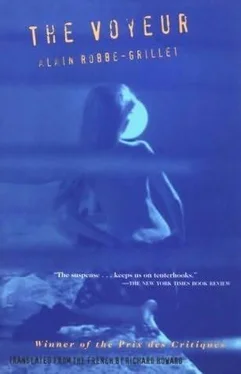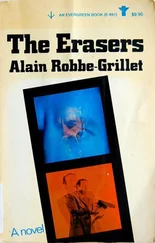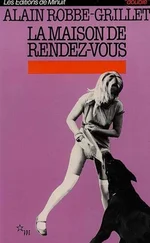Nevertheless, certain differences of detail were noticeable. One glass was missing from the last row of those used for the wine-base apéritifs; two other glasses, furthermore, were not of the same make as the rest, from which they could be distinguished by a slight pinkish cast. This heterogeneous row thus included (from west to east): three units of the orthodox type, two pinkish glasses, and an empty place. In this series the shape of the glasses resembled a slightly convex barrel on a smaller scale.
It was from one of these—a colorless one—that the salesman had just drunk.
He lifted his eyes toward the gray-haired fat woman and saw that she was watching him—had been watching him, perhaps, for a long time now.
“Well, Maria…. What did she want me for? You said just now…. What did she mention me for?”
The proprietress continued to stare at him. She waited almost a minute before answering.
“No reason. She only wanted to know if anyone had seen you. She expected to find you in the village. That’s part of the reason she came this far.”
After another pause, she added: “I think she wanted to have a look at your watches.”
“So that’s what’s at the bottom of it!” said the salesman. “Well, you’re going to see for yourself that what I have here is well worth going a few miles out of your way to find. Her mother must have told her. If you ever admired splendid watches, ladies and gentlemen, prepare yourselves…”
As he continued in a tone bordering on parody, Mathias picked up his suitcase from between his feet and turned around to set it down on a table near the one where the three sailors were drinking. They looked in his direction; one moved his chair to be able to see better; the woman walked around the bar and came closer.
The copper-plated clasp, the cover, the black memorandum book, everything went as usual, without deviation or obstruction. Words, as always, worked a little less well than gestures, but with nothing too disturbing in the total effect. The proprietress wanted to try on several styles which had to be detached from the cardboard strips and afterward replaced as well as possible. She fastened them on her wrist one after another, moving her hand about in all directions to determine their effect, suddenly revealing a coquettish self-interest which her appearance scarcely suggested. She finally decided on a large watch with a heavily ornamented case in which the hours were indicated by tiny, complicated designs of interlaced knots rather than by numbers. Originally, perhaps, the artist had been inspired by the shapes of the twelve numbers; so little of them remained, however, that it was virtually impossible to tell the time—without a close examination, in any case.
Two of the sailors, who wanted their wives’ advice, asked the salesman to stop by after lunch. They lived in the village, of which the topography could scarcely be complicated; nevertheless, they began extremely lengthy explanations to indicate the location of their respective dwellings. They probably gave him a number of useless or redundant details, but with such exactitude and such insistence that Mathias was completely confused. A description of the place containing willful eiTors would not have misled him more; he was not certain, in fact, that a good many contradictions were not mixed in with their redundancies. Several times he even had the impression that one of the two men was using the words “to the right” and “to the left” almost by chance—indiscriminately. A quick sketch of the cluster of houses would have cleared up everything; unfortunately, none of the sailors had anything to write with, the woman was too absorbed by her recent purchase to offer them a sheet of paper, and the salesman had no desire to have his memorandum book used as a spot-map. Since he intended to visit every house in the village anyway, he soon decided merely to nod with an understanding expression and not even listen to the rest of the directions, which he nevertheless punctuated now and then with a convincing “All right” or “Yes.”
Since their two houses were in the same direction in relation to the café, the sailors had at first taken turns telling him where they were, the one who lived farthest away beginning his account where his companion left off. As an extra precaution, the first sailor began all over again as soon as the second one had finished. The successive versions referring to the same ground to be covered naturally included variations—which seemed, in fact, considerable. But then a real disagreement arose about the beginning of the route, and both men began to talk at once, each trying to impose his own point of view, although Mathias could not even understand the difference between them. The dispute would have been endless if the dinner hour had not forced them to put a provisional end to it: the salesman would settle the discussion later by telling them which way he considered better; since he spent his life on the road, he must be a specialist in such matters.
They paid for their wine and left, accompanied by the third, still silent, sailor. Mathias, who could not call on his customers before one-forty-five or two (because of the island’s appreciably later daily routine as compared to that of the mainland), had plenty of time to eat his two sandwiches. He carefully put back the contents of his suitcase, closed it, and sat down at a table to wait for the return of the proprietress, who had disappeared into the room behind the counter; then he would order something to drink.
Alone now, he looked straight ahead, through the window, at the road that passed through the village. It was very wide, dusty—and empty. On the other side rose an unbroken stone wall higher than a man, doubtless screening some of the lighthouse outbuildings. He closed his eyes and thought how tired he was. He had risen early in order not to miss the boat. There was no bus line between his house and the harbor. In an alley of the Saint-Jacques district a ground-floor window revealed a deep, rather dark room; although it was already broad daylight, the light from a little lamp fell on the unmade bedsheets at the head of the bed; lit at an angle, from below, a lifted arm cast its magnified shadow on the wall and the ceiling. But he couldn’t afford to miss the boat: this day on the island could save everything. Counting the first watch he had already sold in town this morning, just before getting on board, his sales still amounted to no more than four. He would write them down later in the memorandum hook. He thought how tired he was. Nothing disturbed the silence, neither in the café nor outside. No. On the contrary—in spite of the distance and the closed door—the steady crashing of the waves against the rocks beyond the lighthouse was distinctly audible. The sound was so clear he was surprised he had not noticed it sooner.
He opened his eyes. The sea, of course, was not visible from here. A fisherman was standing behind the window and looking into the café—one hand on the doorknob, the other holding an empty bottle. Mathias thought it was one of the men who had been in the café—the one who had not spoken. But when the man came inside, the salesman saw that he was mistaken. He realized, furthermore, that the delighted expression on the newcomer’s face was the result of his own presence. The sailor walked straight over to him with loud exclamations: “It’s really you? I’m not seeing things?”
Mathias rose from his chair in order to shake the hand held out to him. He made the handclasp as brief as possible and made a fist as he drew back his arm, so that his nails were hidden within Iris palm.
“Oh yes, it’s me all right.”
“Good old Mathias. It’s been a hell of a long time!”
The salesman fell back into his chair. He did not know what to do. At first he had suspected a hoax: the fellow was merely pretending to know him. Since he did not see the fisherman’s advantage in such a trick, he abandoned the idea and declared without further reserve: “My God, yes! It has been a hell of a long time!”
Читать дальше












